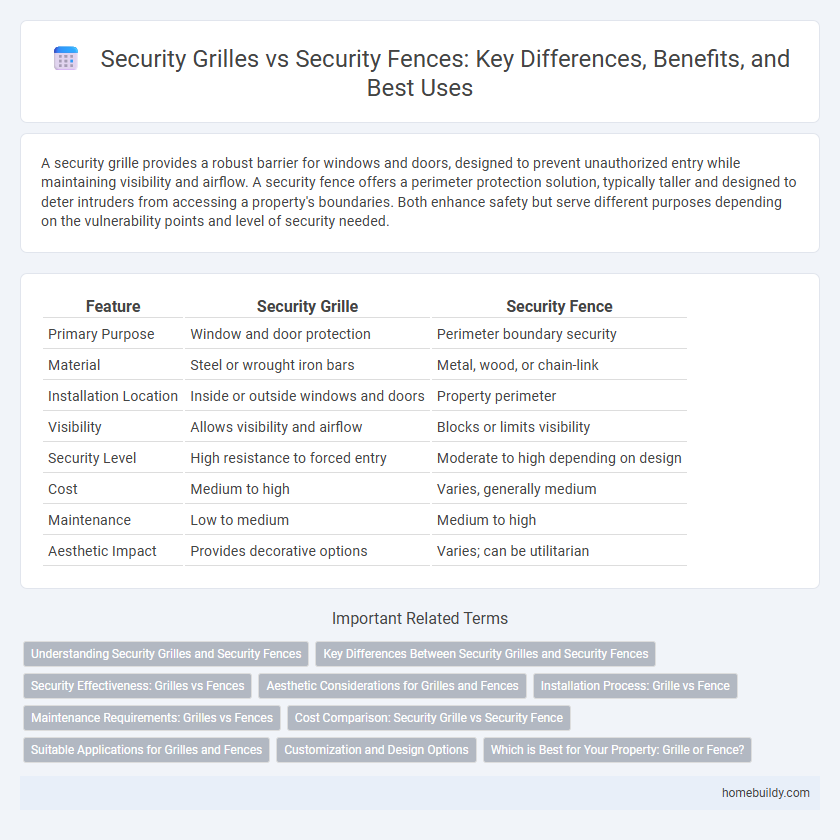A security grille provides a robust barrier for windows and doors, designed to prevent unauthorized entry while maintaining visibility and airflow. A security fence offers a perimeter protection solution, typically taller and designed to deter intruders from accessing a property's boundaries. Both enhance safety but serve different purposes depending on the vulnerability points and level of security needed.
Table of Comparison
| Feature | Security Grille | Security Fence |
|---|---|---|
| Primary Purpose | Window and door protection | Perimeter boundary security |
| Material | Steel or wrought iron bars | Metal, wood, or chain-link |
| Installation Location | Inside or outside windows and doors | Property perimeter |
| Visibility | Allows visibility and airflow | Blocks or limits visibility |
| Security Level | High resistance to forced entry | Moderate to high depending on design |
| Cost | Medium to high | Varies, generally medium |
| Maintenance | Low to medium | Medium to high |
| Aesthetic Impact | Provides decorative options | Varies; can be utilitarian |
Understanding Security Grilles and Security Fences
Security grilles are designed to provide enhanced visibility and ventilation while maintaining a physical barrier, making them ideal for windows and storefronts, whereas security fences offer perimeter protection with taller, more robust structures to deter unauthorized access. Security grilles use materials like steel or aluminum, often featuring customizable designs for aesthetic appeal and functional security, while security fences typically prioritize height, strength, and durability with materials such as chain link, wrought iron, or steel panels. Understanding the distinct applications and material properties of security grilles versus security fences helps determine the appropriate choice for specific security needs and environments.
Key Differences Between Security Grilles and Security Fences
Security grilles offer flexible, transparent protection primarily for windows and doorways, allowing visibility while deterring intrusion, whereas security fences provide a solid perimeter barrier designed to enclose larger outdoor areas. Security grilles are often made from steel or aluminum bars arranged closely to prevent entry but maintain airflow, while security fences vary from chain link to wrought iron, prioritizing height and sturdiness. Maintenance requirements differ as security grilles typically need less upkeep compared to outdoor security fences exposed to weather conditions.
Security Effectiveness: Grilles vs Fences
Security grilles offer a higher level of security effectiveness compared to security fences due to their tightly spaced bars and fixed installation, which prevent unauthorized access and climbing. The robust construction of security grilles withstands forced entry attempts more effectively than most fences, which can be cut or scaled more easily. Security grilles also provide enhanced visibility and ventilation while maintaining a strong physical barrier, making them suitable for securing windows and doors.
Aesthetic Considerations for Grilles and Fences
Security grilles offer a sleek, customizable design that enhances aesthetic appeal without compromising safety, often available in various patterns and finishes to match architectural styles. In contrast, security fences typically emphasize functionality over form, with heavier materials and simpler designs that may appear more imposing or industrial. Choosing security grilles allows for better visual integration with modern or residential properties, providing both security and aesthetic value.
Installation Process: Grille vs Fence
The installation process for security grilles typically involves mounting the grille directly onto window or door frames using screws or brackets, which can be completed swiftly with minimal structural alterations. Security fences require setting posts into the ground and securing fencing material between them, a more labor-intensive procedure that demands excavation, concrete setting, and alignment. While grilles provide a compact, space-saving solution for securing openings, fences offer perimeter security but require more extensive groundwork and time to install.
Maintenance Requirements: Grilles vs Fences
Security grilles require less maintenance compared to security fences due to their durable materials and corrosion-resistant coatings, reducing the need for frequent repairs or repainting. Security fences, often exposed to harsher outdoor elements, necessitate regular inspections, rust treatment, and structural adjustments to maintain effectiveness. Choosing security grilles can significantly lower long-term upkeep costs while ensuring robust perimeter protection.
Cost Comparison: Security Grille vs Security Fence
Security grilles generally have a lower initial cost compared to security fences due to simpler materials and installation processes. Maintenance expenses for security grilles remain minimal as they require less frequent repairs and painting, unlike security fences that may incur higher upkeep costs from rust or damage. Overall, security grilles offer a cost-effective solution for property protection without compromising durability and security.
Suitable Applications for Grilles and Fences
Security grilles offer a compact and visually unobtrusive solution ideal for storefronts, windows, and interior access points where visibility and airflow are important. Security fences provide robust perimeter protection, making them suitable for outdoor areas such as industrial sites, large properties, and boundaries requiring high-level deterrence. Choosing between grilles and fences depends on the need for access control, visibility, and the level of physical security desired for the specific application.
Customization and Design Options
Security grilles offer extensive customization options with various materials, patterns, and finishes tailored to fit architectural aesthetics and security needs, unlike security fences which usually have standardized designs prioritizing perimeter protection over style. Security grilles can be integrated into windows, doors, and storefronts, providing a versatile solution for both residential and commercial properties. Their design flexibility allows for decorative elements that enhance curb appeal while maintaining robust security.
Which is Best for Your Property: Grille or Fence?
Security grilles provide a sturdy barrier with better visibility and ventilation, making them ideal for storefronts and windows, while security fences offer perimeter protection suited for larger properties and open areas. Grilles typically require less space and are easier to integrate into existing structures, whereas fences offer varied height options for enhanced deterrence. Choosing between a security grille and fence depends on the property's layout, security needs, and aesthetic preferences.
Security grille vs Security fence Infographic

 homebuildy.com
homebuildy.com